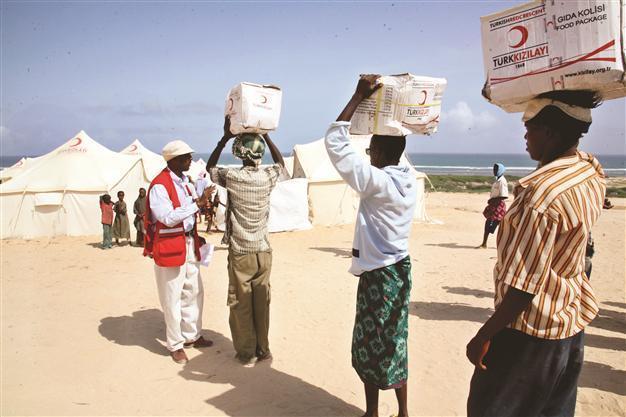Somalia possesses great potential to become regional star, envoy says
ISTANBUL- Hürriyet Daily News

Humanitarian aid from Turkey and some other Muslim countries which followed in its footsteps has helped Somalia overcome its hunger problem, according to Turkish Ambassador to Mogadishu Kani Torun. Courtesy of Turkish Red Crescent
Somalia bears the potential to become a shining star in East Africa if the country can maintain peace and stability, according to Kani Torun, Turkey’s ambassador in Mogadishu.
However, this potential does not derive from natural resources alone but also its human power, Torun
told the Hürriyet Daily News on the sidelines of a Somalia nongovernmental organization meeting
earlier this week.
“A big human potential also lives in the diaspora,” he said. “And they are hardworking people. I believe that Somalia may even become a donor country, not an aid receiver, soon once it overcomes political and security problems.”
Somalis living abroad have already started building ties with their home country, Torun said.
Turkey opened its embassy in Mogadishu last year.
Along with routine diplomatic tasks, the embassy is responsible for coordinating Turkish aid to the country and development programs there, greatly facilitating Ankara’s work in the country.
Turkish Prime Minister Recep Tayyip Erdoğan’s visit to Mogadishu on Aug. 19, 2011 was a milestone,
Torun said.
“Before that visit, the representatives of the international community used to have meetings at the airport and return immediately. Mogadishu was presented as one the
most dangerous cities in the world,” Torun said.
Aid from KenyaInternational aid bodies were working from the Kenyan capital of Nairobi, which is a trend that continues, he said.
“A taboo came to an end after the prime minister’s visit which was followed by Turkish bodies working there and the launch of the embassy. It became visible that one may work directly in Mogadishu,” he said.
The humanitarian help from Turkey and some other Muslim countries which followed have helped Somalia overcome its hunger problem, according to Torun.
Looking at its resources, Somalia should never face hunger, he said. “The main reason [for hunger] was the civil war. Today, the country has come a long way toward overcoming this problem.”
All of these changes have raised the feeling of confidence in the country.
“The people have started to rebuild collapsed buildings. The state mechanism has started to operate. A hospital was opened,” he said.
Turkey makes a difference by organizing aid inside the country and centrally, the ambassador said.
Other countries are accessing Somalia via the United Nations, but this feeds bureaucracy, Torun said. A large portion of the aid is spent on housing the U.N. staff, mainly in Nairobi.
“Besides, the U.N. agencies often cooperate with local contractors,” Torun said, noting that this may also cause some losses.
On the other hand, Turkish groups distribute the aid directly, finding those who are in need, he said.
The number of Turkish embassies across Africa has grown from 12 to 33 in the last 10 years, he said.
“This is a move belated move,” Torun said. “Africa is usually [synonymous] with hunger. But there is large economic potential there and Turkey has failed to use this.”
